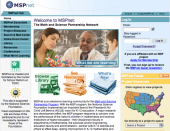Thanks to Temple's IT and Society Research Group (ITSRG) for creating a space for "citizen cartographers" to show their work. I hope this opportunity continues beyond June into the coming months.
How are citizen cartographers making a difference when engaged with particularly intractable global issues such as environmental collapse and international conflict? The evidence is slim, but now that ITSRG has tuned us in to the concept of "citizen cartography" we'll probably begin noticing many examples where individuals and small groups are making a difference by re-drawing the maps we've inherited and by creating entirely new maps that help us to visualize global transformation.
The problems between the US and Iran are again demanding our attention. The chronic antagonism that has infected relations between these nation-states certainly prompts citizen innovation, especially since these governments seem to have no incentive to give peace a chance. I'm reminded of the early '90s when I was involved in promoting network connectivity for Maine's libraries and schools. A librarian from a rural Maine school testified at a utilities commission hearing that the "Internet will bring world peace." Of course I was skeptical, but as long as we got our online connections, why should I argue? The promise that the emerging "information superhighway" would do away with the "constraints of distance and time" also seemed like over-the-top hype to me.
While we usually think that cartography represents places and spaces, we can also think of cartography as a way to create spaces that don't exist yet, or as a way to re-create spaces that have been lost socially and geographically. About a year ago I began to inhabit a place cartographically that I last visited physically nearly 50 years ago, the small city of Abadan, Iran where I lived from 1958 to 1960 as a teenaged American boy (see photo essays here). The responses have been overwhelming, showing that there is a huge unmet need for people to connect personally across gaps of culture, time, politics and geography.
Public mapping technologies such as Wikimapia point the way toward reclaiming and even re-inhabiting territories that have been completely occupied by contending state interests. The City of Abadan is situated on a major river (variously named, depending on what national claims are held) that for many years (decades? centuries? millennia?) has served as a major conflict zone. The city, formerly Iran's largest refinery and oil port, suffered widespread destruction from bombing and siege during the Iran-Iraq war (see http://en.wikipedia.org/wiki/Siege_of_Abadan for more information). The house my family lived in was destroyed, but its footprint is still visible on the Wikimap. By annotating this plot, I could reclaim a part of my personal history by use of a public map technology.
Sites like Wikimapia open the door to reclaiming a collective history based on shared connections to a beloved place. Annotations to the Abadan Wikimap are now mainly in three languages: English, Persian / Farsi, and Arabic. The stories told from these three lingustic perspectives are very different, but there is a chance for dialogue within this shared mapped space. I'm encouraging people who have contacted me to collaborate in bridging these perspectives through translating existing annotations into all three languages. I visualize this as a project for Iranian teachers (some of whom have been in touch with me) who want to broaden both the language skills and the intercultural awareness of their students.
Meanwhile, the deeply felt need to establish direct person-to-person contacts across this critical international divide has been taken up by other projects such as EnoughFear.org. As a project of The Action Mill. EnoughFear has posted hundreds of photos of individual Americans, Iranians and others whose hands reach out with a shared message, No to War between the US and Iran. This project also sponsors direct public person-to-person telephone conversations between the US and Iran.
So far there's not a mapping component to EnoughFear. Both this and the Wikimapia reclamation effort seem to share in trying to create new spaces for international direct citizen dialogue. My personal belief is that regions such as Abadan, whose geopolitical situation has bred ceaseless conflict, are candidates for reclamation as international peace zones. (See Zones of Peace and Zones of Peace, a History. Learning to recognize the stake that each of us has as "global citizens" might help us to re-define our tasks as "citizen cartographers."
Thanks again to ITSRG for creating this space.
Paul Schroeder
June 30, 2008
|
0 Comments
|
ITSpace: Geographies Flickr BITSArchives
November 2011

BlogrollBest Green Blogs Categories
All
|
 RSS Feed
RSS Feed

